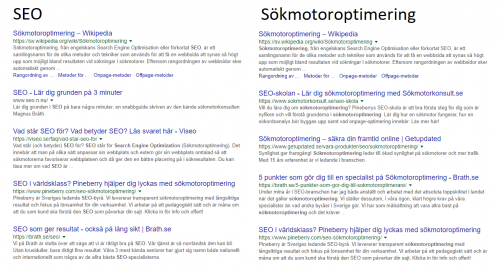
As Google’s algorithm becomes increasingly intelligent, will the SEO industry disappear? When only good content matters, doesn’t that make the SEO consultant meaningless? We received a question last week that we thought was so good it deserved its own article.
Google claims to have made great strides in artificial intelligence, and there’s some truth to that. Among other things, they’re ahead when it comes to spreading AI, for example with their AI Experiments. But when it comes to their algorithm, it is still far from being smart enough to consistently present the “best” content.

Today, Google is nowhere near actually understanding text. When it comes to images, videos, and audio files, they’re even further behind. The example above illustrates this quite clearly, even with a touch of humor (it’s a search in English, on Google.com, from NY – you can check it yourself with our local search tool). It’s clear that page titles and URLs play a major role in what Google chooses to show, rather than function. At present, there is no feature that can understand that I want to find a smart search engine and then point me to one.
Not even SEO and search engine optimization are understood

If you compare results for SEO and search engine optimization, you’ll see that while there are similarities, the results are still quite different overall (even though the same companies optimize for both). This is despite the fact that SEO and search engine optimization are exactly the same thing. Take Pineberry’s SEO school, for instance, which holds second place for “Sökmotoroptimering” – why is it outshined by our SEO.n.nu on the keyword SEO? If second place is held by a training program on the subject in both terms, why not let the best one appear in both search results (whichever that may be)?
But in the future Google will get smarter
If we set aside the fact that content is also part of SEO and focus on everything else, it’s clear that content is less decisive for what appears in search engines today. If the best content were the key factor, two completely different schools wouldn’t be ranking – the one with the best content would appear in both. Instead, factors like domain, backlinks, and technical aspects are decisive in this case.
But what about the future – won’t Google get smarter, even if it isn’t very smart today? Yes, that’s true. What we need to realize here is that “smarter” doesn’t mean the same thing for an algorithm as it does for a human. It can become more complex, include more factors in its calculations, and weigh these factors with greater precision. However, it still depends on what can be observed online and, unlike us, it can never test a product and evaluate it. Not for the foreseeable future, at least.
For the most part today, it measures some form of popularity and what words (or synonyms) a page contains or is mentioned in connection with. That’s still a long way from being able to judge which retailer of a product is the best.
During the years I’ve worked with Google’s algorithms, the search engine has certainly become much more complex to handle, but it has never truly “understood” anything.
A more complex algorithm increases the demand for specialists
So if we return to the question – will there really be a need for SEO specialists in the future? My answer is obvious: increasing complexity places higher demands on specialists, not the other way around. SEO is becoming more difficult to execute; that doesn’t decrease the need, it increases it.
